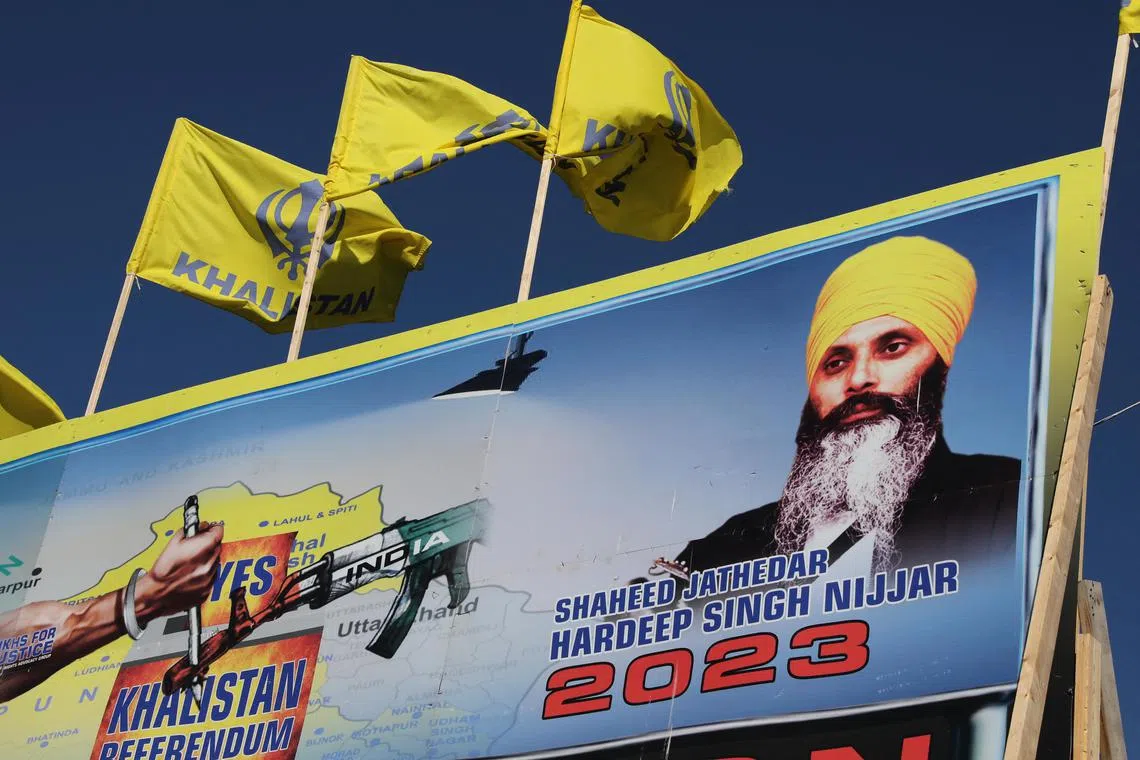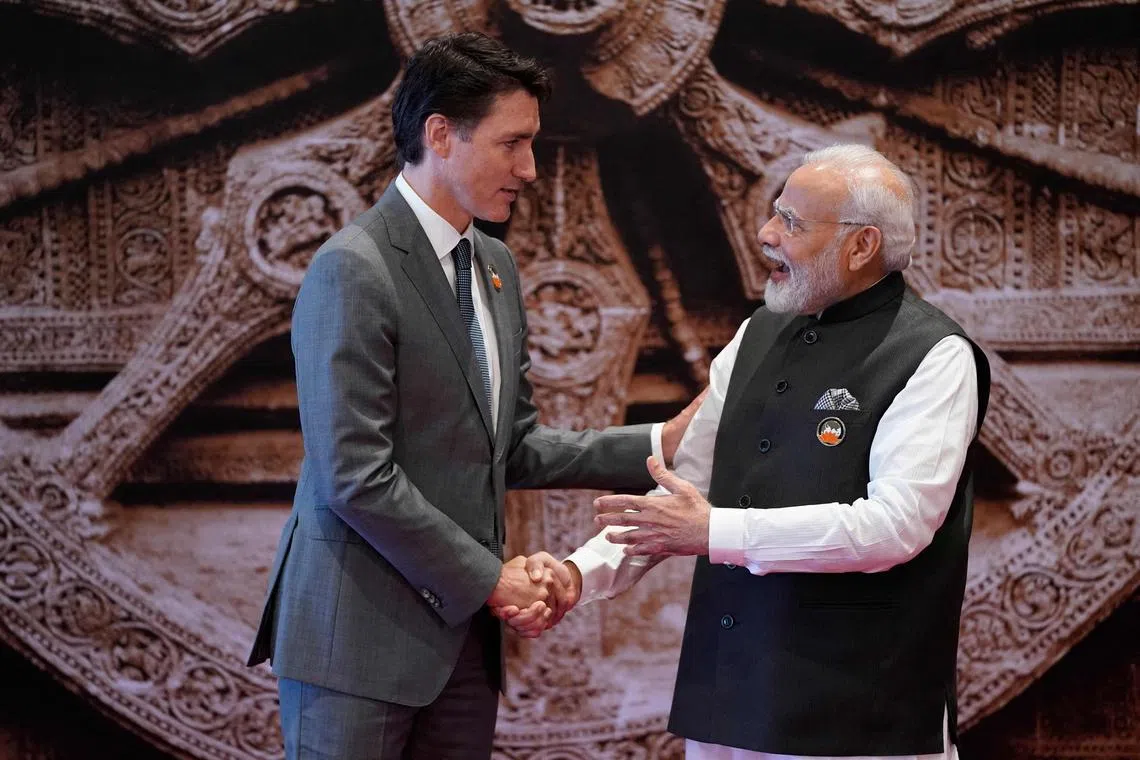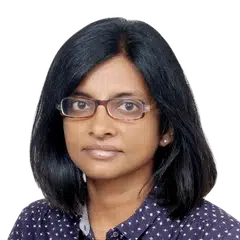Trudeau links murder of Sikh separatist to Indian government, triggering diplomatic row
Sign up now: Get ST's newsletters delivered to your inbox

Canadian citizen Hardeep Singh was gunned down outside a Sikh temple in British Columbia in June.
PHOTO: REUTERS
Follow topic:
NEW DELHI - India and Canada expelled senior diplomats and traded charges as ties plunged to a new low after Canadian Prime Minister Justin Trudeau linked Indian government agents to the June murder
India dismissed the allegations as “absurd” and “motivated” as it expelled a Canadian diplomat in a tit-for-tat move, hours after an Indian diplomat was expelled from Canada.
Mr Trudeau told Canada’s House of Commons, or Lower House of Parliament, on Monday that “Canadian security agencies had been actively pursuing credible allegations of a potential link between agents of the government of India and the killing of Canadian citizen Hardeep Singh Nijjar”.
“Any involvement of a foreign government in the killing of a Canadian citizen on Canadian soil is an unacceptable violation of our sovereignty,” added Mr Trudeau.
Mr Nijjar was gunned down outside the Guru Nanak Sikh Gurdwara (or temple) in British Columbia
Ties had already been strained for some time between the two countries. India has concerns over separatist activities in Canada.
Mr Trudeau had also sought to raise the latest allegations of Indian involvement in Mr Nijjar’s murder with Prime Minister Narendra Modi on the sidelines of the Group of 20 summit.
He said on Monday that Canadian intelligence and security agencies had also shared “deep concerns with their Indian counterparts”.
Canada is yet to reveal details of what its leads are of Indian government involvement in Mr Nijjar’s death.
On Tuesday morning, Mr Trudeau said Canada will follow the evidence and “hold people to account”.
“The government of India needs to take this matter with the utmost seriousness,” he told reporters on his way to a Cabinet meeting.
“We are not looking to provoke or escalate,” he said. “We are simply laying out the facts as we understand them, and we want to work with the government of India to lay everything clear and to ensure that there is proper process.”

Mr Trudeau (left) sought to raise the latest allegations of Indian involvement in Mr Nijjar’s murder with Prime Minister Narendra Modi on the sidelines of the Group of 20 summit.
PHOTO: AFP
India maintains its innocence and pointed the finger instead at Canada for harbouring those who advocate a separate Khalistani homeland. Canada is home to around 770,000 Sikhs, the biggest group of adherents of the religion outside India.
“The space given in Canada to a range of illegal activities including murders, human trafficking and organised crime is not new,” said a Ministry of External Affairs statement.
“We reject any attempts to connect the Government of India to such developments.”
The ministry later said that the Canadian High Commissioner to India, Mr Cameron MacKay, had been summoned and informed of the expulsion of the Canadian diplomat, who has five days to leave the country.
“The decision reflects the Government of India’s growing concern at the interference of Canadian diplomats in our internal matters and their involvement in anti-India activities,” a second statement said.
The expelled Indian diplomat, meanwhile, was identified by Canadian Broadcasting Corporation, Canada’s public broadcaster, quoting Canada’s Foreign Minister’s office as Pavan Kumar Rai of the Research and Analysis Wing, India’s foreign intelligence agency.
Mr Rai, according to the web page of the Indian High Commision in Canada, is in charge of community affairs, among other responsibilities.
In June, the Canadian Press quoted Mr Trudeau’s national security adviser Jody Thomas as saying that India is among the top sources of foreign interference in Canada, clubbing the South Asian country with Russia, Iran and China.
The allegations and counter allegations between the two countries have erupted amid mounting tensions over Khalistani separatist activities in Canada.
The movement for a separate state of Khalistan
At the time, the Indian state of Punjab was racked by a violent separatist movement, which was snuffed out after its leader Jarnail Singh Bhindranwale was killed in a 1984 Indian Armed Forces operation at the Golden Temple in Amritsar, the pre-eminent spiritual site of Sikhism.
Later that year, former Indian Prime Minister Indira Gandhi was assassinated by her Sikh bodyguards, sparking off deadly anti-Sikh riots.
While there is limited appetite in Punjab for a return to those days of violence, the demand for Khalistan has remained strongest among certain elements in countries like Canada, Britain and the United States.
Mr Nijjar, identified as a plumber in Canadian media reports apart from being the president of the gurdwara where he was killed, was reportedly active in organising a referendum in Canada on the demand for Khalistan.
India, however, had identified him as a key figure in the secessionist movement for Khalistan.
The killing of Mr Nijjar happened a year after the targeted killing of Mr Ripudaman Singh Malik in British Columbia.
Mr Malik had been acquitted in 2005 for the 1985 midair bombing of Air India Flight 182, which was en route from Toronto to London.
The bombing, in which 331 people were killed, was believed to have been carried out in retaliation for the Golden Temple operation.
There has been much concern over why the Khalistan issue has suddenly flared up in recent times.
In June, a tableau depicting the assassination of the late Indira Gandhi by her bodyguards was part of a parade in Canada’s Brampton – which has a sizable Sikh population – causing an uproar in India.
In March, India had protested against Khalistani supporters organising referendums on a separate state of Khalistan.
In July, India summoned the Canadian High Commissioner to lodge a protest after posters were distributed by pro-Khalistan elements with photos of the Indian High Commissioner to Canada Sanjay Kumar Verma and other diplomats as the “the faces of Niijar’s killers”, raising concerns over the safety of Indian diplomats in Canada.
India has also summoned Canada’s High Commissioner in March over threats of “separatist and extremist elements” targeting Indian diplomatic mission and consulates in Canada”. Hundreds of protestors had gathered outside the Indian consulate in Vancouver.
India has this year expressed concern over targeting of Indian missions and diplomats in not just Canada but also Britain and the US. In March, pro-Khalistan protesters managed to take down the Indian flag at the Indian High Commission in London. Protesters had also breached the security barriers and planted Khalistani flags in the Indian consulate premises in San Francisco.
Within India, the revelations have roused debate on whether Canada has a strong case on Indian involvement. There was also incredulity that Canada accused India of a targeted killing.
“It’s strange for a prime minister to make the statement that he has made on the basis of allegations. Trudeau, who for reasons personal or political, seems to have upped the ante without giving due consideration to (India-Canada) relations, which are not just inter-state,” said former Indian diplomat Rajiv Dogra, who noted that what was at stake was also a large Indian diaspora in Canada with strong links to India.
The former chief of India’s foreign intelligence agency Amarjit Singh Dulat, too, expressed surprise over the allegation in an interview to journalist Karan Thapar.
“It sounds bizarre to me that this kind of thing has happened. The Canadians have got it wrong. Something doesn’t sound right. We just don’t do it. It hasn’t been done,” he said.
Canadian media reported that Mr Trudeau had also shared this development with his counterparts in Britain, US and France.
White House National Security Council spokesperson Adrienne Watson said the US is “deeply concerned about the allegations” made by Mr Trudeau and that the US is in close touch with Canada.
“It is critical that Canada’s investigation proceeds and the perpetrators be brought to justice,” the statement added.
The Australian government also said it was “deeply concerned” by the allegations, noting “all countries should respect sovereignty and the rule of law”.
A British government spokesperson said it is in “in close touch with our Canadian partners about these serious allegations”.
Analysts said it remained to be seen whether Canada’s allies would take it beyond expressing concern, given the importance of ties with India, the world’s fastest growing economy as per the International Monetary Fund and, for the West, a bulwark against China.
“While it’s not entirely evident to me how far America and UK or other Western allies will go in their support for Canada, they will also need to be sensitive that India’s concerns pertain to extremism and separatism, something that in principle has to be pushed back against,” said Professor Harsh V. Pant, vice-president for studies and foreign policy at New Delhi-based think-tank, the Observer Research Foundation.


